I recently led a weekend retreat with the theme “Be Who You Are, Perfectly Well,” the title drawn from a favorite quote by St. Francis de Sales. And since St. Thérèse of Lisieux, his fellow Doctor-of-the-Church-who-was-wise-beyond-her-years, expressed similar sentiments in her writings, I designated them the primary guides of the retreat. They each lived in times of heightened clericalism and ecclesial power and authority—he in the early seventeenth century, she in the late 19th—yet each managed to rise high above the confining walls of institutional religion and journeyed deep within themselves, where they discovered a God of boundless love and mercy, alive and well beneath the surface.
Since I didn’t want to put the full burden of the weekend retreat on the holy shoulders of these two wisdom figures alone, I enlisted the assistance of four other BFF’s in heaven, none of whom is an official saint just yet, but each of whom is on the way: Venerable Augustus Tolton; and Servants of God Dorothy Day, Thea Bowman and Nicholas Black Elk. In light of the many injustices they each endured in an institutional church and nation riddled with racism and misogyny, I sensed that they would be more than happy to share morsels of their wisdom and experience with 35 adult children of God who identify as LGBTQ and their beloved and loving allies.
The retreat was sponsored by the Marianist Social Justice Collaborative and was held in the beautiful Mercy Center in St. Louis, described as “an environment of hospitality and healing in the tradition of the Sisters of Mercy.” It is worth mentioning here that the planning team originally had a different location in mind for the retreat but were denied permission to do so by the local bishop of that diocese. It is also worth mentioning that a mercy-filled and fulfilling retreat experience was enjoyed by one and all in the Plan B location. So, my heartfelt thanks to the Holy Spirit and that bishop for making possible such a “good time in the Lord”—in the words of Sr. Thea.
I have a lot—a whole lot—of material in my trove of artwork and stories on each one of these saints who have been inspiring my creative imagination for many years and have filled me with hope, courage and determination. So, in a spirit of “Less is More,” I condensed my thoughts into one tidy image called A Cloud of Witnesses to set the tone. I then highlighted each saint separately and gave them the opportunity to visit us in word and image. Or—technically speaking—their words and my images.
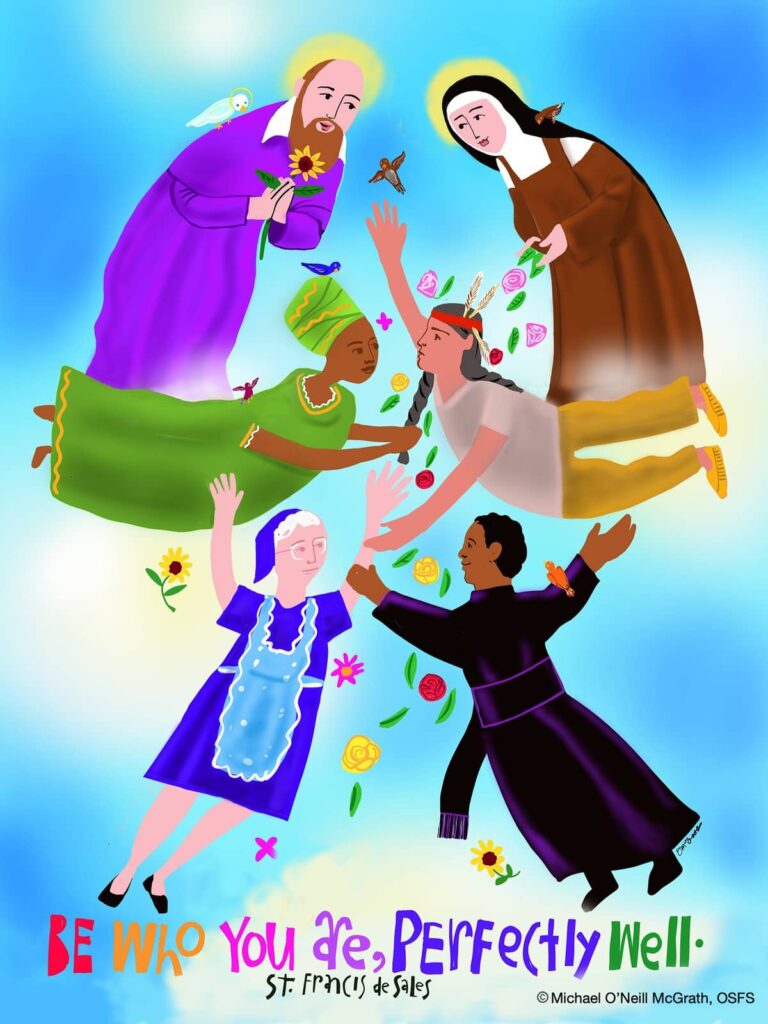
St. Francis de Sales
(1567-1622)
St. Francis was a bishop, a canon lawyer and a civil lawyer, which to my creative right brain can be a pretty terrifying trifecta. But the thing I love about Francis de Sales is that he never put laws and his pursuit of perfection above the human heart. It is said that the word love appears at least once on every single page he ever wrote. In addition to books, treatises and articles, he composed letters of spiritual direction, mostly to women, a pretty invisible population in the all-male, clerically dominant church of the Counter-Reformation era. St. Francis celebrated the extraordinary ordinary, saying we are all just little birds seeking shelter under the maternal wings of God, no matter who we are: male or female; rich or poor; mighty or humble, clergy or lay.

In the Salesian tradition, the essence of a happy life is not just being who you are perfectly well, but loving who you are; and doing everything in a spirit of love, not fear. St. Francis was also a proponent of the notion that all people—not just priests and religious—would benefit from having a trusted spiritual director with whom they could share their questions, insights and imaginations. I often think of St. Francis as the first psychotherapist because he understood so clearly and sensitively the inner workings of the human heart and mind—and the human longing for love and acceptance.
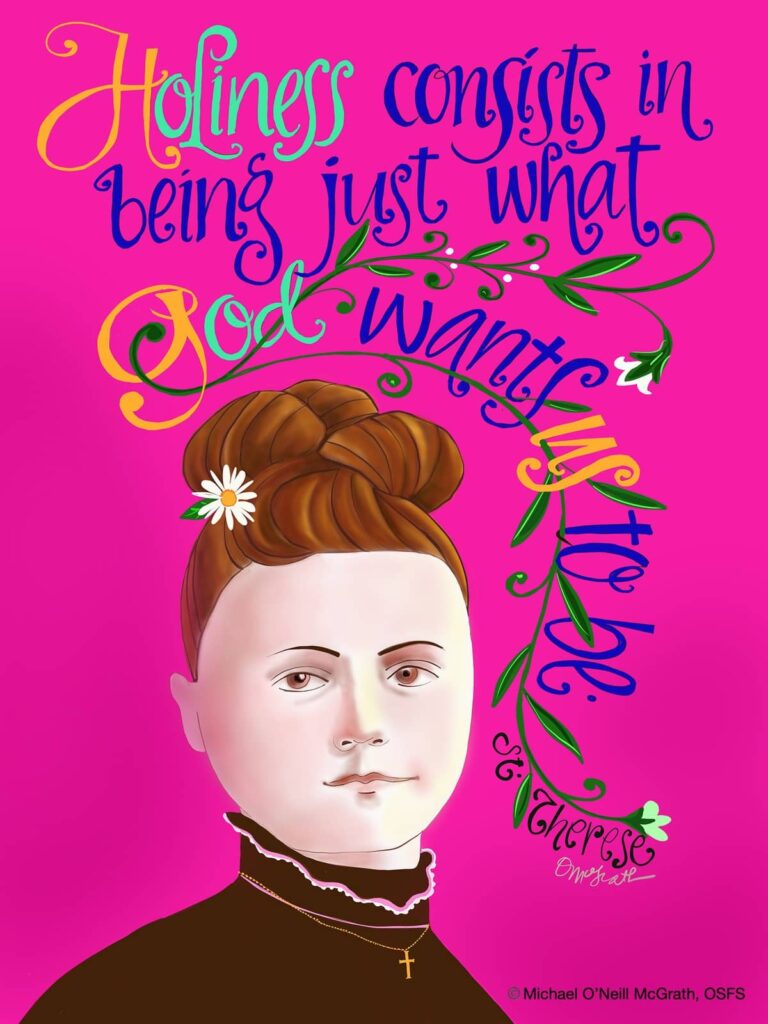
St. Thérèse of Lisieux
(1873-1897)
What’s not to love about St. Thérèse, the Little Flower, the most beloved saint of modern times? She has something to offer everyone because, like St. Francis de Sales whom she admired, she celebrated the little and the ordinary. In her own simple way she keeps telling me time and again, “Come on, you can do this. I am here. Embrace the sparrow you are meant to be, not the eagle you only wish you were meant to be.”
The beauty of the Little Way, the name for her spiritual path to wholeness and maturity, is that it centers on God’s boundless love and mercy, not on guilt, sin and self-loathing. In fact, she rarely mentions the word sin in her writings. Like St. Francis de Sales whom she loved, St. Thérèse encourages us not simply to be ourselves, but to love being ourselves.
Thérèse hid a lifetime’s worth of suffering beneath her radiant smile and cheerful demeanor—from the emotional pain of grief and loss in her motherless childhood to the physical agony of tuberculosis which led to her death at twenty-four. Through it all she journaled; she wrote encouraging letters to people in need of hope and healing; she painted; and she wrote poems and plays. St. Thérèse nurtured her highly creative spirit because she found in it a peaceful, contemplative outlet for her inner-most needs, concerns and desires.
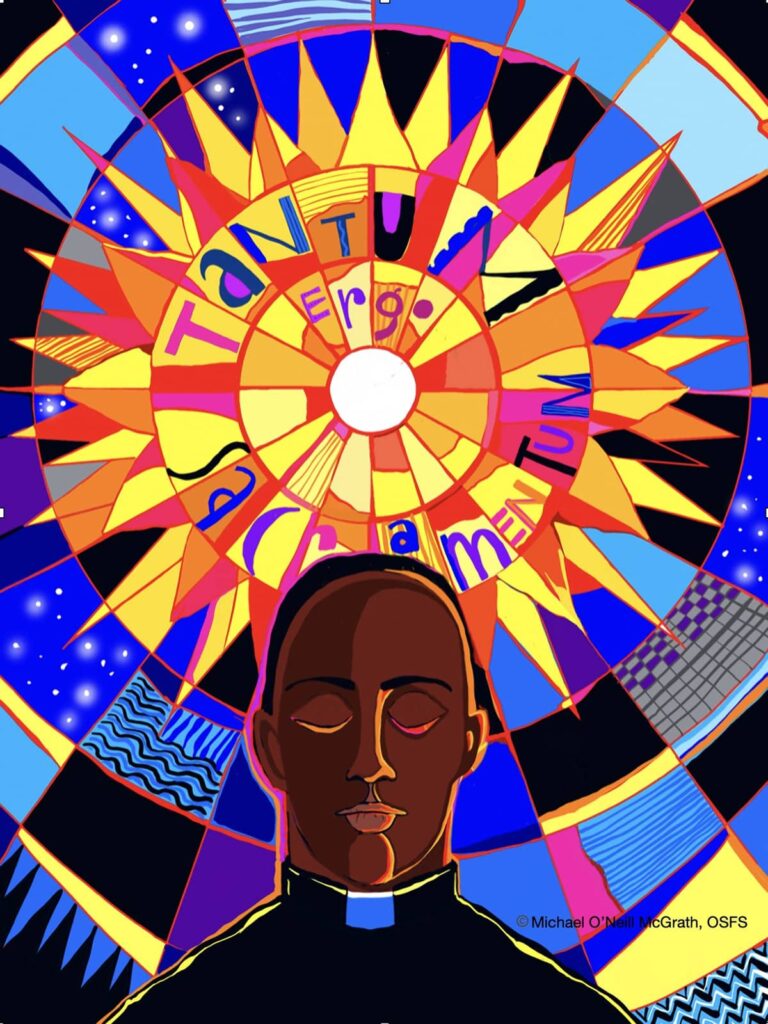
Venerable Augustus Tolton
(1854-1897)
Imagine you are born into slavery. Then imagine you are five years old and forced to watch your mother being viciously beaten and whipped by her Catholic slave owner. Then imagine you are twelve and forced to leave the local Catholic school because white parents don’t want their kids sharing the classroom and playground with you. (And imagine the names they call you.)
Then imagine you feeling a genuine call to the priesthood, but not one of the 18 Catholic seminaries in the United States will admit you, for essentially the same reasons as those white parents back in grade school—only they give it a loftier, more theological spin.
Imagine you have to go all the way to Rome, in steerage no doubt, to study for ordination after saying goodbye—you assume forever—to the same mother who escaped with you from slavery when you were a little boy. Then imagine your life as a pastor back home in the US, where everyone loves you, even white folks and Protestants, except for your fellow Catholic pastors who probably think you are intrinsically disordered because of your race and thus unfit for priestly life—and are insanely jealous of your popularity.
Imagine you grow sickly and old beyond your 43 years and you collapse on the streets of Chicago in a heatwave and die in utter exhaustion with your mother by your side, the same faithfully Catholic mother who taught you more about living Jesus and the Gospel than all those troublesome pastors who hadn’t a clue about true Christian love but man-oh- man, could they ever preach about laws and doctrines and dogmas.
Now, perhaps, you can imagine why I love Venerable Gus Tolton!
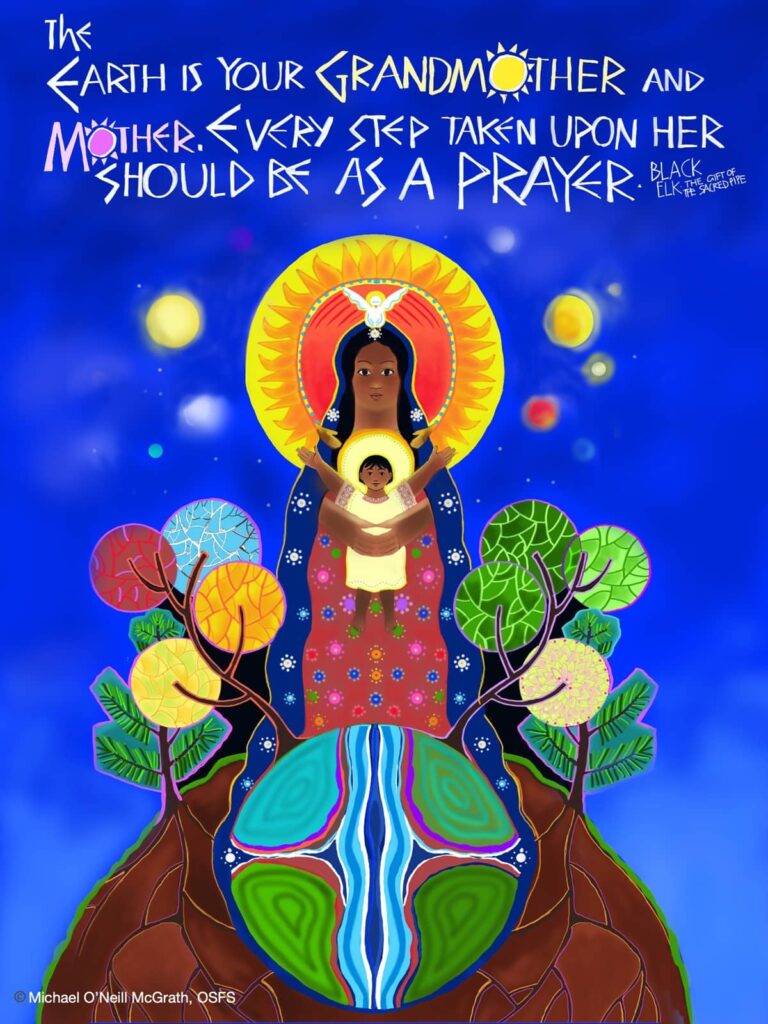
Servant of God Nicholas Black Elk
(1863- 1950)
This past year, while on a Maryknoll Mission Immersion tour, I was blessed to stand on the site of the Wounded Knee Massacre, where in 1890 American soldiers mowed down over 300 Indian men, women and children whom they falsely claimed were staging an insurrection.
Black Elk, a Lakota medicine man, arrived on the scene after the killings and helped to carry the wounded to a nearby church, where many more died, and then to the nearby Jesuit mission the next day. In 1904, he became Nicholas Black Elk when he was baptized on the feast of St. Nicholas. He spent the rest of his years as a widely loved and highly regarded evangelist, preacher and healer who worked closely with the Jesuits. He was also a devoted father and grandfather.
Like Gus Tolton, Black Elk knew that the Gospel of Jesus and its message of universal love was deeper, wider, higher and more inclusive than the legalistic and abusive approach too often preached by the institutional Catholic Church in the US—as seen especially in the “Christian” boarding schools of the time, which we as church are still coming to terms with. Nicholas Black Elk transcended the confines of the institutional church and found profound connections between Lakota spirituality and traditional Roman Catholic spiritual traditions, especially Ignatian spirituality.
The quote here illustrates the sacred cosmic connections between humanity, the Holy Spirit and the earth itself. The most basic principle of Lakota spirituality is that We are all connected: people to people; people to creatures; and people to all of creation. Sounds pretty traditional Franciscan if you ask me!
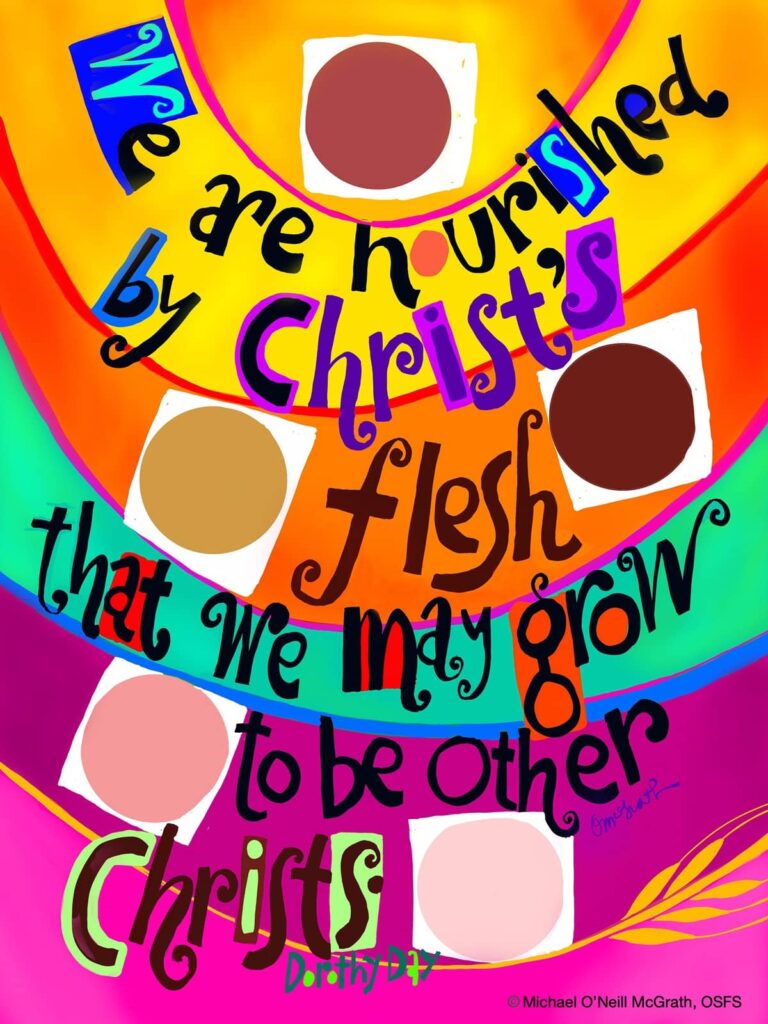
Servant of God Dorothy Day
(1897-1980)
Dorothy Day was born on November 8, 1897—the same year that St. Thérèse and Augustus Tolton each died, he on July 9 and Thérèse on September 30. I like to imagine that their faith-filled spunk, courage and creative determination miraculously floated in her direction and filled her infant soul. In her pre-conversion days as a student at the University of Illinois Dorothy was horrified at the anti-Semitism leveled at her best friend and wondered why the hypocritical Christian churches didn’t speak out about it. Later in her life, she certainly took care of that!
With the heart, eyes and ears of a journalist, Dorothy Day eventually grew to become the very icon of Catholic social teaching and justice, and a prophetic voice of reform in the Catholic Church. She had a Vatican-II soul two generations before the Second Vatican Council was even remotely considered. As co-founder of the Catholic Worker movement, Dorothy Day was Martha and Mary rolled into one complex yet simple model of pure love and peace in action. She loved praying in adoration before the Blessed Sacrament, but her awareness of Christ’s very real presence wasn’t confined to a monstrance or tabernacle, as we see evidenced in the quote illustrated here.
Dorothy was inspired in her love of Christ through reading about and imitating her favorite saints, especially Saint Thérèse about whom she wrote a biography. They each believed and taught that nothing is more important than love, certainly not exclusion or marginalization, nor the clerical abuse of power and authority. Dorothy said that our corrupt church carries within itself the seeds of its own regeneration. She also said we should not do anything but love, whether we feel it or not. Just love, love, love. Now keep that Beatles tune in your head as you face the day.

Servant of God Thea Bowman
(1937-1990)
Thea was the toughest subject for me because I have created what seems like a million images over the years inspired by her life and words—and only had time to share a handful. I focused on that aspect of her life in which she was always “the other”: the only Black in her Catholic world and the only Catholic in her Black world. In her early convent years in the 1950s, Thea was the only Black woman from the Jim Crow South in a sea of white nuns from Wisconsin, who didn’t know what to make of her and were not always as kind and gentle as they now wish they had been. Thea later said that she wasn’t happy she was there in those early years, but she persevered because she felt Jesus and St. Francis were calling her and would never abandon her.
In the 1960s when both the Civil Rights movement and Vatican II appeared on the scene, Thea moved right along with the waves of liberation promised by each. Through her gift of music; her years of teaching at Viterbo University in LaCrosse, Wisconsin; and her nationally acclaimed speeches and presentations, Thea not only discovered the beauty of her Blackness and religious faith, but shared it unabashedly with everyone she encountered—getting folks of all backgrounds up on their feet, swaying and singing in holy rhythm. This included the Bishops of the United States, whom she addressed at their annual meeting in 1989, just nine months before her death.
Among her remarks to the 400 bishops assembled that day, Sr. Thea spoke the words we see here. I cannot help but think she was prophetically alluding to the synodal church in our current Pope Francis era.
As she concluded her speech, racked with pain from her cancer, Thea got those bishops on their feet, swaying and singing “We Shall Overcome” in a most memorable display of the future church—the one I like to believe awaits us when this awkward current time of disunity comes at long last to an end. Oh Happy Day!
Love, love, love
I offer some closing advice about ignoring the barking dogs from the same saintly guy who opened things up for us: Francis de Sales. Sr. Thea said something similar: “It doesn’t matter if you’re scared, just keep on steppin’!”
I hope these tiny glimpses into the lives of these brilliant and bold people of faith inspire you to pursue their lives in more depth. Pick the one who calls for your attention and develop a prayer discipline that works for you. Pour your morning cup of coffee, light a candle and pray with them and to them. Keep your eyes on the prize, walking forward in pride and faith while ignoring the barking of so many dogs surrounding us both in and out of the Church.
Most of all, be patient and gentle with yourself. And remember you are not alone. Bit by bit and step by step, may you discover the love of Christ gently glowing in your heart and driving away the shadows of fear and abuse, of marginalization, persecution and discrimination. Ask Jesus and Mary, Gus and Black Elk, Dorothy and Thea for help and inspiration and most of all, don’t do anything but love, love, love.
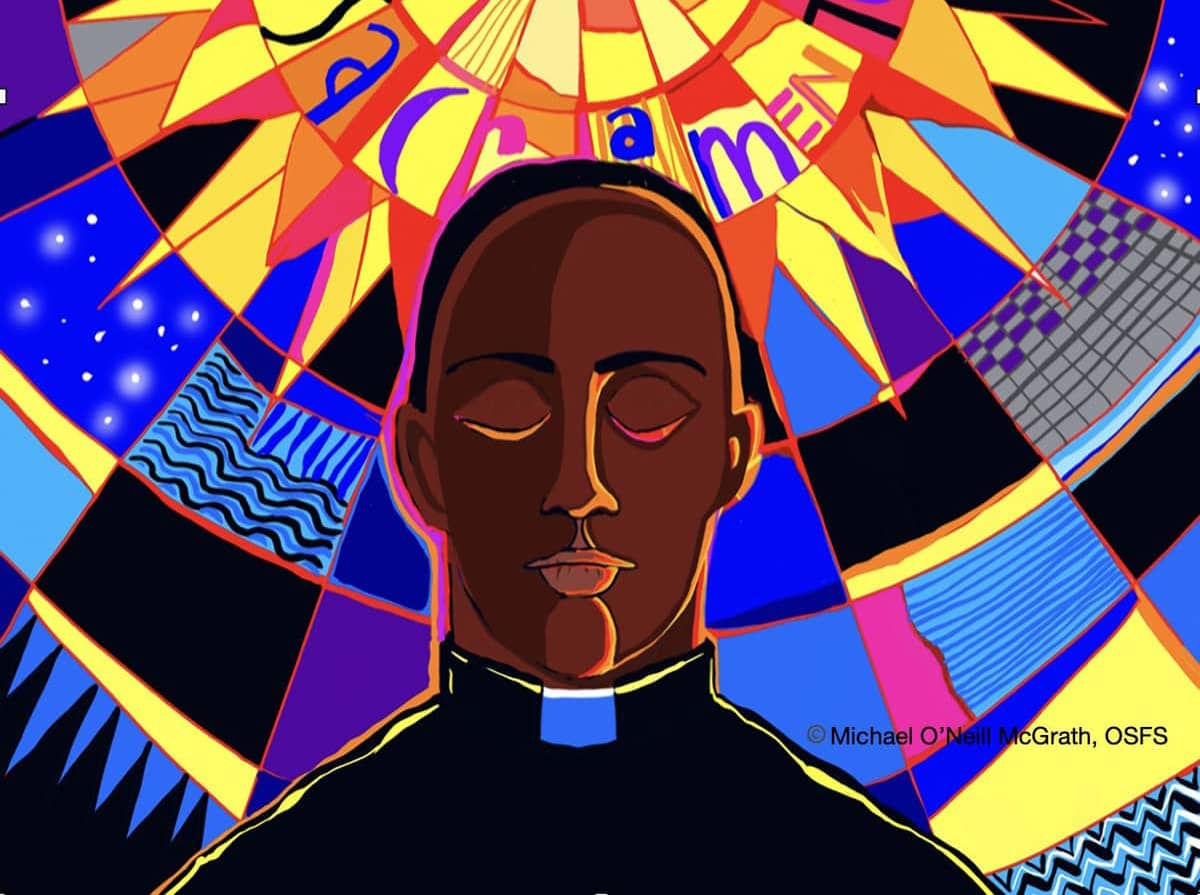


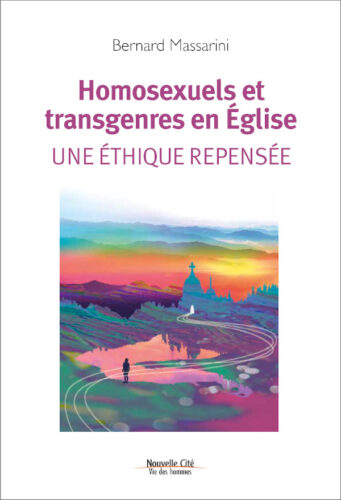
Where can we purchase copies of this beautiful art?
Angela, there is more information about Bro. Mickey’s beautiful artwork (and links to request commissions and purchase some items) at his website: https://www.bromickeymcgrath.com
This is magnificent and you have
Inspired me to learn more about these witnesses and heralds
Every story and every picture are a
masterpiece
And you are a witness
Thank you Brother Mickey